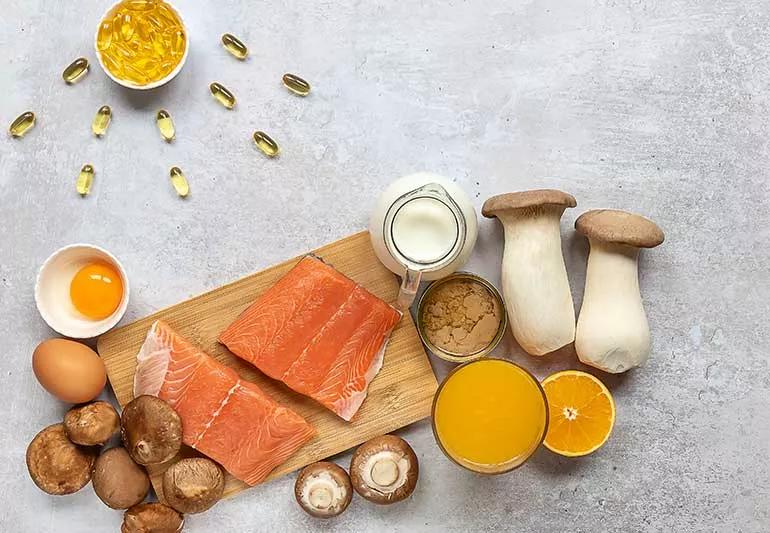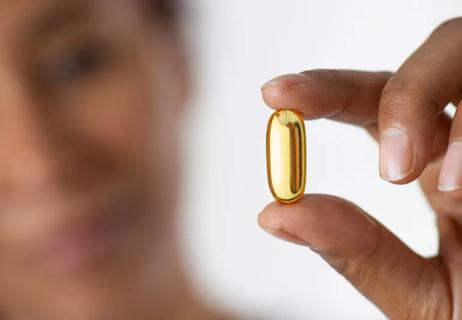If you’ve been diagnosed with breast cancer, having a normal range of vitamin D can help

We could always use a little more sunshine and, more specifically, a little more vitamin D.
Advertisement
Cleveland Clinic is a non-profit academic medical center. Advertising on our site helps support our mission. We do not endorse non-Cleveland Clinic products or services. Policy
But the sun isn’t the only source of vitamin D, as there are plenty of vitamin D-rich foods to work into your diet. So, what’s all the hubbub around this specific vitamin, anyway? And is there a connection to vitamin D and breast cancer?
Breast cancer specialist Shimoli Barot, MD, explains why vitamin D is so important and shares her best advice on how much is enough and how to make sure you’re getting it.
“Vitamin D is an important co-factor in a lot of processes in your body,” says Dr. Barot. “But most people aren’t getting enough.”
Vitamin D is just one of several vitamins you should take daily. It helps improve immunity, maintains functions of your nervous system, improves bone health and regulates blood levels of calcium and phosphorous. But unfortunately, vitamin D deficiency is becoming increasingly prevalent worldwide. And research links low vitamin D levels to a range of health issues, including:
Studies on whether or not vitamin D can be preventive against cancer are conflicting.
According to a 2010 analysis, those with the highest levels of vitamin D in their blood had a 45% decrease in breast cancer risk compared with women with the lowest levels of vitamin D in their blood. Several other studies have shown similar results.
Advertisement
But a 2022 comprehensive review of 84 studies showed there was little-to-no benefit of vitamin use as a preventive measure against cancer. A similar review from 2018 showed there was no conclusive evidence vitamin D specifically could be used in a preventive way.
“At this time, we don’t have strong data to support that taking vitamin D can prevent breast cancer,” says Dr. Barot. “However, if you have breast cancer and are on anti-estrogen treatments, studies have shown normal vitamin D ranges can be helpful in the long-term.”
One such study suggests higher vitamin D levels at diagnosis may also be linked to better survival rates among women with breast cancer.
It’s important to note that while these studies all seem to suggest your vitamin D levels have a direct impact on your breast cancer diagnosis and risk, it may not be a cause-and-effect scenario. More clinical trials need to be done in order to determine the direct mechanism and link that exists between vitamin D and breast cancer development (if one exists at all).
Research in this area is still ongoing, and measuring vitamin D levels can sometimes prove difficult. It’s hard to measure sunlight exposure, and what vitamin D you get in your diet doesn’t always add up to much.
“One of the most important things you can do is obtain regular screening mammograms,” notes Dr. Barot. “While mammograms don’t prevent breast cancer, they can be lifesaving by detecting it at an early stage.”
There aren’t any hard and fast symptoms that crop up if your body isn’t getting enough vitamin D. But you’re more likely to have a deficiency if you live in a colder climate that receives less sunlight during winter months. You’re also more likely deficient if you have a high body mass index (BMI), or if you have darker skin (more melanin in your skin blocks the sun’s ultraviolet B rays).
With so many variables at play, how can you know for sure about your vitamin D levels?
Dr. Barot recommends the following:
Advertisement
In the realm of cancer, research into vitamin D and its link to cancer has been ongoing for quite some time. Studies in animals have suggested that having low levels of vitamin D may increase the risk for developing breast cancer and having higher levels of this micronutrient is linked to better outcomes if you have breast cancer.
But at this time, there’s no conclusive evidence from human trials that having low vitamin D levels may increase your chances of getting certain types of cancer, including breast cancer, or that vitamin D supplementation is an effective strategy for breast cancer prevention.
If you’ve been diagnosed with breast cancer, maintaining a normal vitamin D range is helpful, especially if you’re being treated with anti-estrogen treatments. But Dr. Barot says it’s always a good idea to maintain a normal vitamin D level because it’s also shown to support bone density.
“Until policies and recommendations are made based on data, it’s reasonable to maintain your vitamin D level in a normal range and this can be beneficial if you do get breast cancer,” she continues.
Vitamin D differs from other micronutrients. Your body actually produces the vitamin when you expose your skin to ultraviolet B radiation from the sun. But if you live in an area that doesn’t have a ton of sun exposure, or if you’re looking for ways to increase your vitamin D intake, you can find vitamin D in:
Advertisement
It’s important to note that if you’re interested in taking supplements, it’s always best to talk to a healthcare provider about recommended dosage before taking them to determine what’s safe or effective and to make sure there aren’t any contraindications with any other medications you’re taking.
Advertisement
Learn more about our editorial process.
Advertisement

The ‘sunshine vitamin’ is found naturally in some fish and is added to other foods

In general, you want to take this ‘sunshine vitamin’ with a meal or snack that contains healthy fats

Vitamin D is an umbrella term for both D2 and D3 — both help keep your bones and immune system strong

The benefits of vitamin D include stronger bones, a hardier immune system and better overall health

Research shows that high doses of vitamin D do nothing to lower your cardiovascular risk

It’s important to angle it toward your rectum or back, along the natural curve of your vaginal canal

Research consistently shows that soy-based foods do not increase your risk of breast cancer

Properly prepared, elderberries can be a safe and healthy part of a balanced diet — just steer clear of supplements

Wearing a scarf, adjusting your outdoor activities and following your asthma treatment plan can help limit breathing problems

Your diet in the weeks, days and hours ahead of your race can power you to the finish line

When someone guilt trips you, they’re using emotionally manipulative behavior to try to get you to act a certain way